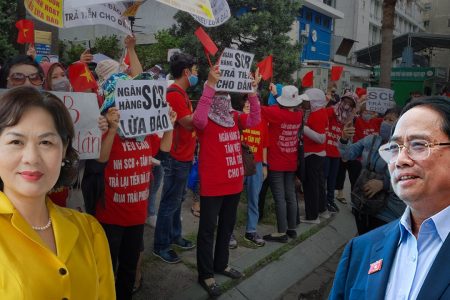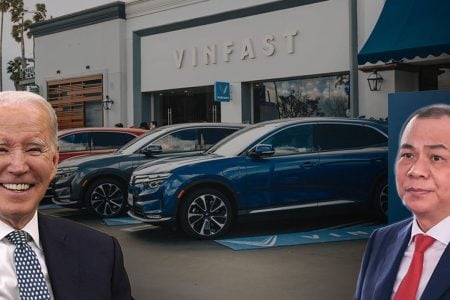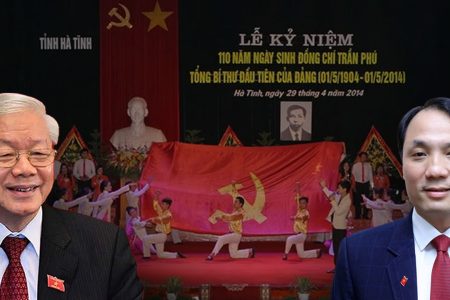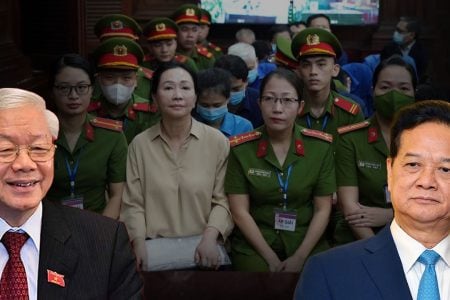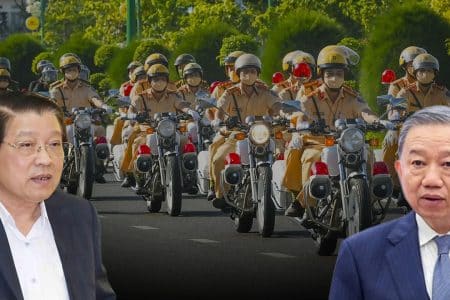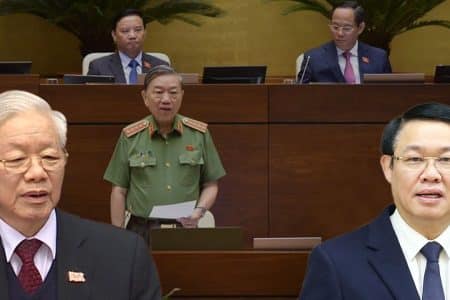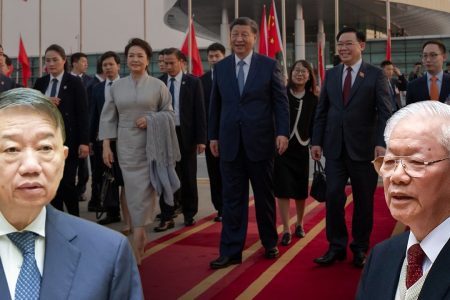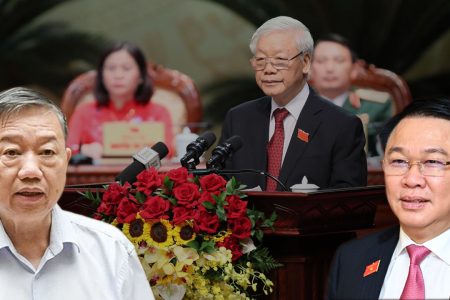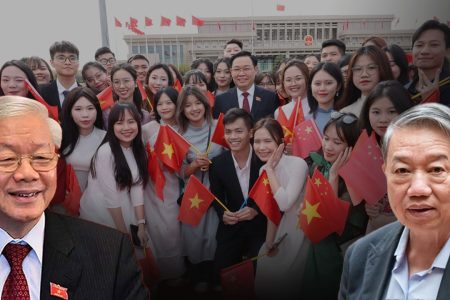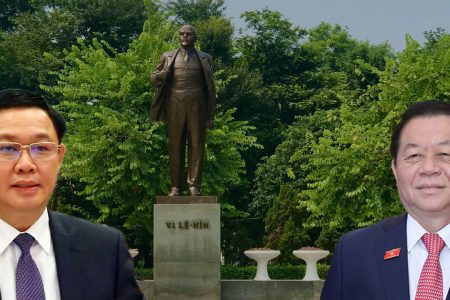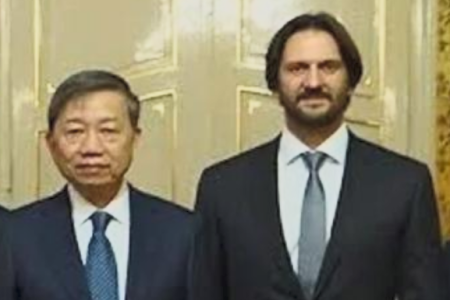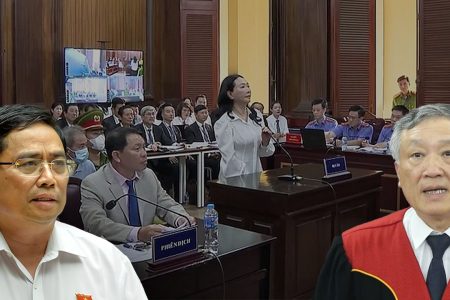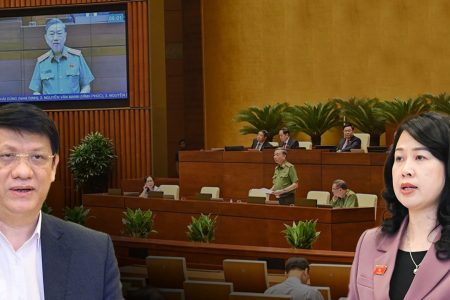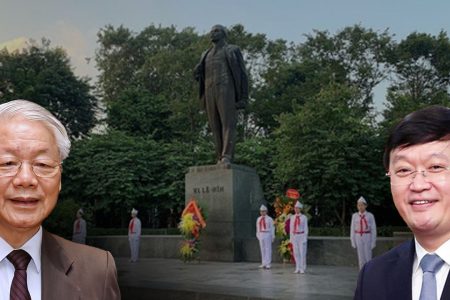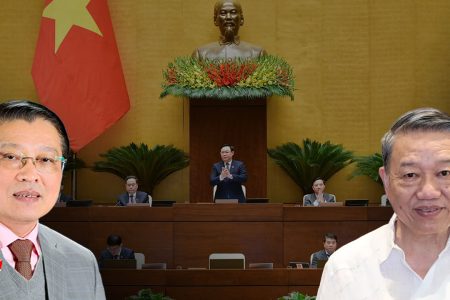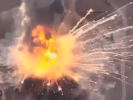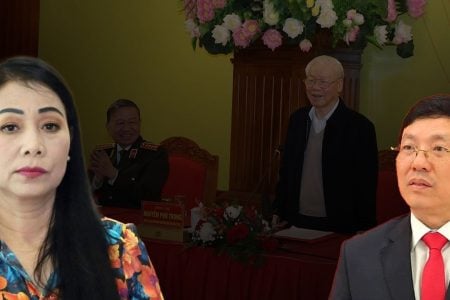
How does Vietnam build alliances with like-minded partners “with the same vision”? Such an alliance full of contradictions, not only breaks the principles of integration diplomacy but also deeply divides the relationship between the Vietnamese government and the local people.
Forming a triangle alliance?
According to information from the Russian side, an online video conference has just taken place between Moscow side Major General Sergei Lagutkin, head of the Regional Control Center, and Colonel Ivan Taraev, Head of the Department of International Military Cooperation with the Vietnam People’s Army Major General Do Dinh Thanh and officers of military agencies. “The Russian and Vietnamese sides have agreed on the topic of upcoming military exercises, determining the date, time, and venue for the organization.” For the first time, at the headquarters of the Eastern Military District, the Russian-Vietnamese joint military drill planning conference was organized and conducted. The online meeting affirmed that the purpose of the exercise was to improve the practical skills of commanders and advisers in organizing combat training and unit management in a complex tactical environment as well as perfecting non-standard solutions when performing the task. Until the evening of April 20, 2022, the Vietnamese state newspapers still did not have any information about this event. However, the parties suggested that the exercise could be named “Kontinentalnyi Soyuz – 2022” (Continental Union – 2022).
It is known that in June last year, Vietnamese Defense Minister Senior Lieutenant General Phan Van Giang had a phone conversation with General Sergey Kuzhugetovich Shoigu, Minister of Defense of the Russian Federation. Senior Lieutenant General Giang at that time emphasized: “In the most difficult years of the struggle for independence and national reunification as well as in the construction and defense of the Fatherland of Vietnam, the people and the armed forces of the Soviet Union, including the Russian Federation, play a key role, always standing side by side with the Party, State and people of Vietnam. Vietnam always remembers and is grateful for the great and effective support and help of comrades, many generations of Vietnamese cadres trained in the former Soviet Union and the Russian Federation became senior cadres of the Party, State, and Vietnam People’s Army.”
Meanwhile, with the People’s Republic of China, Vietnam’s state-controlled media has just said that the first joint patrol in 2022 in the Gulf of Tonkin between the Coast Guards of the two countries Vietnam and China began on April 19 and lasted until April 21. On April 17, the Coast Guard ships 8004 and 8003 belonging to Squadron 11, Command of the Coast Guard Region 1 of the Vietnamese side departed from Haiphong to carry out the above task. This patrol is spread over a range of 13 points. Since June 30, 2020, when the Agreement on Fisheries Cooperation in the Gulf of Tonkin expired between the two countries, the two countries’ Coast Guards still organize annual joint patrols in this area. The joint patrol aims to contribute to the implementation of international law, especially the provisions of the 1982 United Nations Convention on the Law of the Sea (UNCLOS), as well as the Agreement, signed on December 25, 2000, between Vietnam and China Agreement on the Delimitation of the Gulf of Tonkin, delimiting the territorial sea, exclusive economic zone and continental shelf of the two countries.
In addition to the armed forces, the two-party communist foreign affairs agencies of Vietnam and China have also recently met online. On the morning of April 19, Mr. Le Hoai Trung, Head of the Communist Party of Vietnam (CPV) Central Committee’s External Relations Department had an online conference with Mr. Tong Dao, Head of the Communist Party of China (CPC) Central Committee’s External Liaison Department. The online conversation between the two Central Commissions for Foreign Affairs of the two Parties focused on reiterating the cooperation activities through the party channels between the two countries, which play an important role in guiding the overall relationship between the two parties and the two states.
China both reminds and threatens Vietnam
Over the past time, the two Central Commissions for Foreign Affairs have also closely coordinated and promptly advised the Party Central Committees of each country, especially the two General Secretary, to orient the bilateral relationship. The issues raised by Vietnam at the talks were the congestion of goods at the border area, the recognition of COVID-19 vaccine passports, the requirement to comply with three legal documents on border management on land, maintain peace and stability and properly handle issues at sea; coordinate with ASEAN in implementing the Declaration of Code of Conducts in the South China Sea (DOC) and promoting the development of the Code of Conducts (COC) in the South China Sea. However, international analysts put a big question mark on the April 14 phone call between the two foreign ministers of Vietnam and China. What did China mean when it declared, “Don’t let something like Ukraine happen” to Vietnam? In a dialogue with his Vietnamese counterpart, Foreign Minister Wang Yi brought out the situation in Ukraine to outline the consequences if the relationship between the two countries is not handled skillfully. Wang Yi named the US by name and accused it of “inciting tension and confrontation” in the region.

Talking to RFA, Professor Carlyle Thayer – an expert in security in the Asia-Pacific region – explained that the Chinese Foreign Minister brought up the Ukraine matter to scare his Vietnamese counterpart: “I had to think long and hard after reading the memo about this phone call. Because the same scenario as Ukraine can only happen in case China decides to intervene in Vietnam. The way China focuses on the topic of Ukraine means that in case Vietnam leans towards the US and harms China’s core interests, China will have the right to respond as Russia did to Ukraine. This is the only explanation I can think of.” Observers also believe that the Vietnamese leaders themselves understand this. Wang Yi’s words, therefore, are both a reminder but also a threat.
In other words, China is applying a “carrot and stick” policy, with the “stick” being a threat to the Ukraine scenario, if Vietnam turns to the US, and the “carrot” being the guarantee of political institutions if Vietnam chooses to maintain its relationship with China. Professor Thayer said that China’s message will be received by conservatives in Vietnam, who are concerned about scenarios of a color revolution, overthrowing the dominant position of the Communist Party. The words of the phone call used by the Chinese side, according to Professor Thayer, were intended to warn and influence Vietnam, in the context of the Summit between the US and ASEAN that will take place in mid-May in Washington, D.C.
Limits of “unlimited friendship”
When Moscow and Beijing both feel pressure from the West, they tend to want to support each other more. However, this also cannot trigger a transition of the state of bilateral relations. Instead of entering into a formal military alliance, it is more likely that Moscow and Beijing will only upgrade security cooperation and improve interoperability without any binding cooperation framework. Russia does not want to participate in many of China’s calculations in Asia and wants to maintain a neutral stance. For its part, Beijing does not want to interfere deeply in the Russia-NATO conflict. Beijing values economic cooperation with Europe and the US and does not want to be caught up in the Ukraine conflict. Beijing voiced its approval of Moscow’s policy toward NATO and the West, largely due to shared concerns about US policy. The joint statement between Russia and China on February 4, 2022, emphasized that the bilateral relationship goes beyond an alliance and has “no limits” in the fields of cooperation.
However, the military crisis in Ukraine puts China in a difficult position as it tries to avoid offending Russia. Beijing highlights a peaceful solution, refrains from criticizing Russia, and opposes Western sanctions. It remains to be seen how much economic assistance China is willing to provide to Russia, considering the importance of Beijing’s economic relations with the West and the challenge of sanctions that Beijing wants to avoid. There is no shortage of evidence to recall, the “Alliance” of Russia – China in the 1950s quickly fell apart. Moreover, the Chinese leadership as early as 1982 set out the line of not entering into alliances with major powers. Such alliances, they explain, “will likely weaken the will to resist the negative actions of China’s partners, which plot to use China to the detriment of China’s own interests.”
After two abstentions, it was Vietnam’s anti-vote to protect Russia and comply with China’s vote at the United Nations. Now there are joint exercises with Russia, maritime patrols with China, and phone calls from the three countries’ diplomats. Observers are somewhat startled, can this situation unfold to lead to the formation of a three-way “Alliance” between Vietnam, China, and Russia in the future? If that is indeed the case, then Prime Minister Pham Minh Chinh will have the opportunity to give an explanation to ASEAN and the US during next month’s summit in Washington. With ASEAN, members are still interested in the Vietnamese Prime Minister’s statement “not choosing sides.” Despite this fact, Vietnam voted against the eight members of the bloc. With the US, the US has not given up its determination to upgrade its relations with Hanoi to a strategic partnership. But with the diplomatic moves as listed, surely Prime Minister Pham Minh Chinh’s mission in the next month in the US is not simple at all.
Thoibao.de (Translated)




